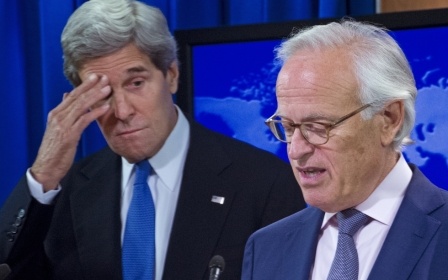Imagining a post-Bibi Israel

As US-sponsored peace talks stagger towards the official finish line of 29 April, Israeli Prime Minister Benjamin Netanyahu is in different ways stronger and more vulnerable than at any other point during his third term.
Netanyahu is now Israel’s second-longest serving prime minister (second only to founding father David Ben Gurion), with every misstep prompting mass speculation over who'll be his successor.
This question is not as straightforward as it first seems, since it must be divided into three distinct lines of inquiry: What is the risk of Netanyahu facing an immediate electoral defeat if the government was to fall tomorrow? How likely is Netanyahu to be brought down by an internal putsch? And finally, if who will succeed him in the long run?
The cast of characters these questions usually bring to mind opens with Netanyahu’s primary coalition partners. Firstly, there is Yair Lapid, a rookie centrist politician who scooped up tens of thousands of middle-class protest votes in the last general elections to end up leading the second-most powerful parliamentary faction in the Knesset (parliament), the Yesh Atid Party with 19 seats.
Then there is Naftali Bennet, the youthful high-tech entrepreneur and former commando at the helm of the most far-right party in parliament, Habayit Hayehud, which won 13 seats in the January 2013 vote.
Received wisdom has is that Netanyahu only just escaped an electoral defeat by either of these two partners, and might not be so lucky a second time. The truth is a bit more complicated.
An uneasy triumvirate
The coalition Netanyahu is heading does not succeed because of daring, agile leadership, but rather thanks to the cautious manoeuvring of three actors who despise each other heartily but have too much to lose from a shift in the status quo.
Netanyahu is mindful of the fact that socio-economic resentment is teeming just below the surface, and even though he deflected some of it by putting Lapid - the middle-class champion - as the Finance Minister in charge of eviscerating the middle class, the discontent may very well turn back on him before too long; now is not a good time to go to elections.
Bennett, already sobered by garnering less at the polls than expected, is mindful of the fact that while Israelis actively resist attempts at partition and settlement evacuation, they aren’t prioritizing settlement construction either.
Bennett is a maverick and an activist, with a bold (to some, inane) vision of annexing much of the West Bank, giving the Palestinians living there Israeli citizenship (with the right to vote,) and putting the two-state plan to rest.
The Israeli public doesn’t want visions, whether utopian or apocalyptic; it just wants to maintain the status quo, which is exactly what Netanyahu has finessed into an art form. So it won’t rush to embrace Bennett’s brave new world either, unless the alternative was somehow even more discomforting.
This uneasy triumvirate has relied on an equally convoluted set of arenas and interests to sustain itself.
By engaging in the almost certainly fruitless talks with the Palestinians, Netanyahu has presented himself as centrist and reasonable, legitimizing himself through centrist Lapid’s membership in his far-right coalition and allowing Lapid to excuse his membership to his own constituents (the same goes for Justice Minister and chief negotiator Tzipi Livni, who leads the smallest faction in the coalition).
The negotiations have given Bennett an arena to joust with Netanyahu and Lapid, without actually challenging either directly and without therefore any real risk. The talks allowed Bennet to assuage the pragmatic wing in his party, to which he himself belongs, while assuaging the messianic radicals who want action.
The status quo candidate
This arrangement around the peace talks has also provided an opportunity for other forms of horse-trading to take place between Bennett and Lapid. The latter turns a blind eye to Bennett’s settlement construction, while Bennett actively supports Lapid’s cultural war on ultra-Orthodox communities in Israel - a war that chimes in well with the deep political and theological rifts between these communities and the settlers.
With the peace process gone, Bennett (pictured right) might well be propelled towards challenging Netanyahu in earnest. This may give Lapid momentum to try and position himself as a compromise leader of a more “moderate” coalition, although right now he is so toxic it doesn’t seem a particularly prudent thing for other parties to be considering.
So Netanyahu’s fear is not of being beaten in a general elections, but simply of being unseated, even by the frailest of alliances - say, between Lapid and Labor’s Isaac Herzog (however wary the latter might be of getting in bed with the number one target of his party’s criticism), or between Bennett and the far-right wing of Netanyahu’s own Likud.
If the fear is strong enough, Netanyahu might well be tempted to try and replace one of his troublesome senior partners with someone from the opposition’s abundant pool of agreeable centre-leftists - ditching Bennett in favor of the ultra-Orthodox or Labor, or Lapid in favor of the same.
A liberal centre-left bogeyman
However, either scenario seems unlikely, and far more risk-fraught for Netanyahu than the status quo. Much of the speculation around the identity of his successor looks further on, when general elections are called for or when Netanyahu, as he reportedly hopes to, retires triumphantly after winning a fourth non-consecutive term in 2014.
The most oft-mentioned of these long-term successors is Foreign Minister Avigdor Lieberman - a leader of his own party, Yisrael Beitenu, but also a member of the Likud-Beitenu parliamentary faction, which Netanyahu and he concocted just before the last election.
Lieberman has worked long and hard to escape the typecast role of the sectorial, “Russian” immigrant politician that first propelled him to power over a decade ago. He has even purged most prominent Russian-speakers from the party, and took care to do perishingly little to avail the hardships faced by Russian immigrants. His merger with the Likud also brought him closer to the non-sectorial, “ordinary” mainstream.
That Lieberman is eyeing for premiership is about as open a secret as it gets in Israel; the prospect of the heavy-handed, heavily accented, decidedly illiberal strongman ascending to the top job has long been a favourite nightmare scenario for the local political scene. This prospect was reawakened when Lieberman was acquitted early this year of corruption charges that hung over him for over a decade.
He seemed to have finally confirmed his ambition when, speaking to an audience of Russian-American Jews gathered in a Brighton Beach synagogue last week, Lieberman topped off a list of achievement by Russian Israeli Jews by musing that “soon we may have a Russian-speaking prime minister”. (Nine out of Israel’s 14 prime ministers spoke Russian, but you get the point).
What’s more, Lieberman (pictured left), now outnumbered vastly on Netanyahu’s right flank, has been busily carving out a role to his left, chastising his cabinet colleagues for their public rows with US President Barack Obama and Secretary of State John Kerry.
He has been literally embraced by the embattled secretary of state in return - a nationalist, capitalist strongman eager to play ball with the United States is rarely frowned upon in Foggy Bottom, especially when this is the very strongman many once suspected of wanting try and pull Israel towards the Russian orbit.
Still, manoeuvres and machinations notwithstanding, Lieberman - whether for lack of charisma, lack of military experience so prized by the Israelis, or simply for being what he is - a thickly accented, dodgy-looking Russian immigrant - is actually the least favoured candidate by the Israelis to be prime minister, lagging behind everyone else at a mere 10 percent.
Granted, you don’t always need to be elected to become prime minister, but at least for now, Lieberman is only really seen as a frontrunner by the same people who see him as a bogeyman of the the liberal centre-left.
Another candidate who threw down the gauntlet to Netanyahu just on the weekend of April 12-13 is Netanyahu’s own former communication minister, Moshe Kahlon. Kahlon’s determined push for reform of the cellular market made him the only senior Likud official to be recognized as having done something to alleviate Israelis’ exorbitant cost of living. He quit politics just before the last elections at the peak of his popularity, insinuating he was jumping before being pushed by an increasingly jealous Netanyahu.
Kahlon has spent the past year away from the spotlight, using his post as the head of an institute on reform and leadership in a small Israeli college to crank up a production line of position papers, economic plans and strategies. The aim is a nationalist party with a human face, oriented not so much at combatting security threats but at ameliorating the plight of the average Israeli, thrown by the wayside in Netanyahu’s blind dash to privatization and de-regulation.
In his grand comeback interview over the weekend in the newspaper Yedioth Ahronoth, Kahlon also castigated Likud for swerving too far to the right. However, he faced push back almost immediately by journalists and politicians who recalled that Kahlon’s own staff within the Likud was composed of the most hard-right activists, far to the right of Netanyahu himself.
For all the fanfare and anticipation, polls concurrent with the interview put a hypothetical party led by Kahlon only at 10 seats, most of which would come from Lapid - enough to make him the kingmaker, but certainly not the king. Even Lieberman and Kahlon challenged Netanyahu simultaneously, they would still only get some 10 seats each, with Netanyahu, however rattled, still holding forth with 22.
A third potential candidate to succeed Netanyahu is opposition leader Isaac Herzog. This may not be as obvious as it would seem: the threat Labor leaders posed to more right-wing prime ministers has, since 2000, varied between ardent loyalty in exchange for a seat in the cabinet, and an annoying background noise.
When he defeated the far more combative Shelly Yachimovich in the Labor primaries early this year, Herzog, not too long ago a minister of Netanyahu, was dismissed by many as a screensaver leader, warming the seat until someone with charisma and untarnished credential came along.
In the months since, however, Herzog proved himself a spectacular organizer, using his family’s Orthodox roots and his negotiation skills to forge a more united opposition than Israel has seen in recent years between the secular Zionist left and the ultra-Orthodox parties.
The latter have already rushed to proclaim him the next prime minister, but while his approval ratings have been creeping steadily upwards, they are still below the 50 percent and there is quite a legacy to dispose of.
The ultimate survivor?
The association with the Oslo accords remains so toxic that no Labor candidate has defeated a Likud candidate in 16 years. Moreover, secular, centrist Herzog, the son and the nephew of two presidents, is out of step with all the social and political trends at work in Israel today - with Israeli society becoming more religious, more nationalist every year.
Finally, a fourth somewhat wildcard candidate is Chief of Staff Benny Gantz. Gantz, chosen for his post precisely for being reliable, un-opinionated and lacklustre, is currently the most popular public figure in Israel - more popular even than the national grandfather, President Shimon Peres.
Gantz is due to retire in 10 months, and under a law mandating a three-year cooling off period, he won’t be able to step into politics until 2018 - one year too late to pick up the reins from Netanyahu directly. Nevertheless, liberal columnists writing about Gantz have already started softly bemoaning the law as “draconian”. Since the law was passed to exclude one chief-of-staff - Ashkenazi - from entering politics too quickly, it might well be amended by that late date, to usher in another one.
Netanayhu’s slogan is survival, survival, survival. He has proved himself to be master maneuverer, fracturing the opposition with ease. It is difficult to see him gone in the near future, but one thing seems certain - he will do his utmost to secure an alignment that prevents change.
- Dimi Reider is an Israeli journalist, blogger and co-founder of +972 Magazine. His work has appeared in The New York Review of Books, The New York Times, The Guardian, Foreign Policy, Haaretz, Daily Beast, Al Jazeera and the Jerusalem Post. Dimi is also an Associate Policy Fellow at the European Council on Foreign Relations (ECFR).
New MEE newsletter: Jerusalem Dispatch
Sign up to get the latest insights and analysis on Israel-Palestine, alongside Turkey Unpacked and other MEE newsletters
Middle East Eye delivers independent and unrivalled coverage and analysis of the Middle East, North Africa and beyond. To learn more about republishing this content and the associated fees, please fill out this form. More about MEE can be found here.






